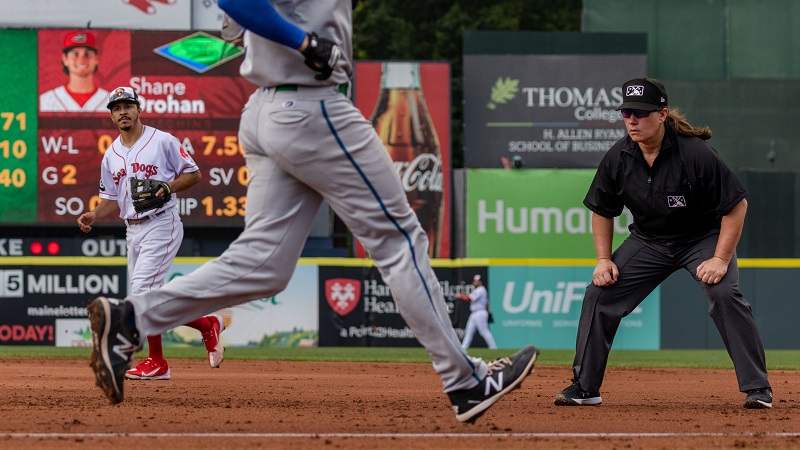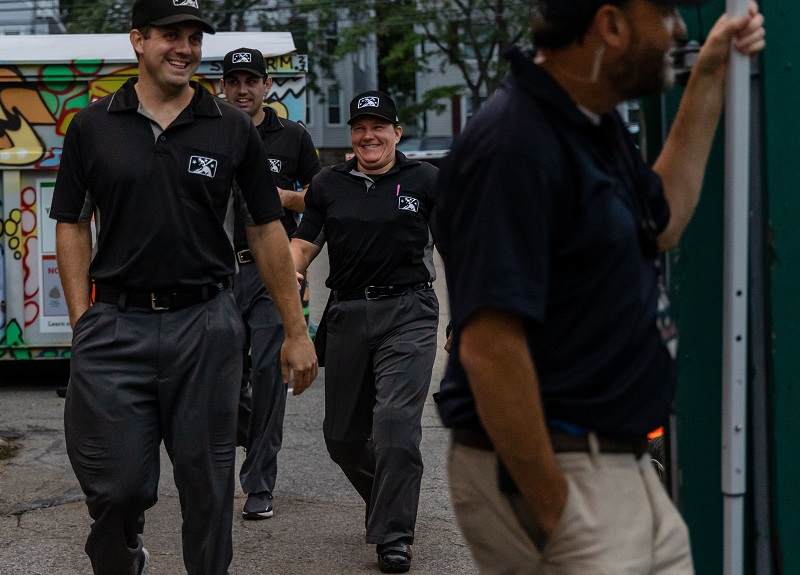MLB is overdue for a female umpire. One may be on the way.

Jen Pawol umpires a Double-A minor league game between the Hartford Yard Goats and the Portland Sea Dogs in Portland, Maine, on Aug. 27, 2022.
15:23 JST, September 3, 2022
PORTLAND, Maine – The first thing to know about Jen Pawol – and listen closely, because this is important – is that she would rather no one know much about her at all. Professional umpires are professionally inconspicuous, and women in baseball have always known the key to a life in baseball is the ability to blend.
The second thing to know about Jen Pawol – and this is important, too – is that she may someday become the first woman to umpire a Major League Baseball game. Pawol, 45, would never say that herself. From her perspective, she and the other members of her three-person Class AA umpiring crew are all in the same position, two steps from the majors, on the cusp of living their thankless dreams.
But people like her crew mates Tanner Moore and Kellen Martin have made the journey to the majors before. No woman ever has. So she is not in the same position as they are, even though she says everyone is doing a remarkable job of treating her like she is.
Fifty years after the passage of Title IX, many women are finding their way into baseball roles no one like them has had before. Kim Ng is the general manager of the Miami Marlins. Eve Rosenbaum was just named assistant general manager of the rising Baltimore Orioles. Kelsie Whitmore is playing in the Atlantic League. Alyssa Nakken is a coach for the San Francisco Giants. Rachel Balkovec is managing a New York Yankees minor league affiliate. That list is hardly all-inclusive.
But only nine women have ever umpired in the minor leagues, according to MLB. Two, Pawol and Isabella Robb, are currently umpiring in the minor leagues. Numerically, she is an outlier. On the field, she is far less so.
As she umpired games between the Portland Sea Dogs and Hartford Yard Goats last week – one at first base, one behind the plate – the only thing that distinguished her from her colleagues was the ponytail that spilled out from under her black hat. Her punchout motion was by the book, neither demonstrative nor tentative.
Catchers thanked her by name when she handed them clean baseballs so often that she almost tired of it. When she lined up at first base instead of behind the plate, coaches fist-bumped her to say hello, and newly promoted first basemen introduced themselves – just like they do for the male umpires they hope will give them the benefit of the doubt. But players still winced and shook their heads when she called a close pitch strike three. A few expressed their displeasure with a pointed question or two, just like they usually would.
“Everyone is so professional,” said Pawol, who admitted she heard the heckler telling her to “go back to Little League school” after one call. She usually gets “go back to softball.” She said she doesn’t care one bit.
“They do it to everyone,” she said with a smile, and indeed, that heckler was particularly indiscriminate in his proclamations. But even for a former teacher who never exactly lacked a backbone, other parts of being a female umpire in the minor leagues do require some extra adjustment.
“I’ve had to shed tremendous amounts of preconditioned responses,” Pawol said. “I listen to the Harvard women’s business podcast all the time. I’ve done a tremendous amount of reading on all these potholes women tend to fall into: Apologizing. Not taking the lead with male counterparts. Letting them do it first. The great thing about sports is once you know the ground rules, you just play the game.”
And everything about the professional umpiring experience is subject to well-honed rules. Even on-field conflicts, Pawol said, are more calculated than they may seem from the outside. Managers and players know where the lines are and what will happen when they cross them. And over seven years of navigating disagreements in that way, Pawol went from fairly sure she could be the on-field authority figure she needed to be to downright certain.
“I want to be ready to take care of my business. If someone else is handling my ejections, I don’t belong out there. I don’t have the backbone to do the job,” Pawol said. “I can stand up for myself. I can be out there as the authority figure. I can umpire the game and run the ship.
“One of our supervisors always says, ‘Rough seas make great sea captains.’ I always think that. If everything is always easy, if you don’t go over waves or through storms, you won’t be ready for whatever happens at the big league level.”

Home-plate umpire Jen Pawol makes a third-strike call during Game 2 of a Double-A minor league double-header between the Hartford Yard Goats and the Portland Sea Dogs in Portland, Maine, on Aug. 27, 2022.
—
Last weekend, during an otherwise baseball-heavy conversation about the realities of her position, Pawol asked a question few umpires had probably ever asked of reporters before: “Are you familiar with the waves of feminism?”
Pawol is, but she wasn’t asking for the sake of historical analysis. Her point was that her ability to pursue her goal of umpiring in the majors is possible because women before her did what she calls the “heavy lifting to push for equality.” And Pawol would know.
Like so many women ascending in baseball these days, she has talked to the ones who found the boulders blocking their way too heavy to dislodge completely, the ones who shoved them far enough off the path that future generations could finish the job. She can rattle off the dates in which women before her served and at what level. If there is an advantage to being a woman in a job like hers, it is that the list of those who came before is short.
So she knows that only one other woman has made it further than she has now, to Class AAA. She knows that woman, Pam Postema, ended up out of baseball working as a welder just a few years after being considered for a job in the National League.
Heck, she even read Postema’s memoir, the one in which Postema detailed the sexism and verbal abuse she received during those years, the one which rued newspaper articles (like this one) because they ruined her plan to keep a low profile long enough that she could reach the majors before small-minded men tried to intervene. Postema was the last woman that headlines posited as the first female major league umpire. Those headlines ran in the 1980s.
Pawol would rather not be in the headlines, either. But other than that, her experience could not be more different from that of the women who came before her, the ones who shortened names from Christine to Chris on umpire school applications, the ones that were excluded from those schools because they didn’t have separate facilities to accommodate women.
“There’s clearly still work to do, but I receive equal pay. I have the same contract. There’s no gender gap. I get equal union representation. I get equal health benefits. I got equal training. I wasn’t given more test questions or easier or harder test questions at umpire school. I get the same supervision. The same number of looks,” Pawol said. “To be in that framework, it’s very relaxing. You can be comfortable in your own skin.”
Pawol had been umpiring for years before she learned affiliated baseball was even an option for women. She grew sick of umpiring local baseball games in Upstate New York and handling Division I softball games in New York and New England. She wanted something bigger.
“Amateur and high school baseball, you pay your $70 to join the umpires, and you get to work those leagues,” Pawol said. “I was really sick of doing that. I wanted a salary. I wanted a contract. I wanted to be in a union. I wanted a career.”
Each year, the New York high school baseball association held an annual clinic with major league umpires. The head of one of her local umpiring associations called her one Friday afternoon in 2015 and asked her if she was enrolled in the clinic, which was scheduled to begin the next day. She wasn’t. By Saturday morning, she was.
At that clinic, she met longtime MLB umpire Ted Barrett and bought a ticket to his clinic in Georgia the next year. At that camp, Barrett asked her if she wanted to be a professional. He told her about the umpire camps. She enrolled.
Pawol paid for her own ticket to one of those minor league umpire feeder clinics, then earned a scholarship to umpiring school. For years, the road to professional umpiring ran through private umpiring schools like the one founded by Harry Wendelstedt (father of current big league umpire Hunter) in 1977 or the one run by Jim Evans until Minor League Baseball stopped accepting its students in light of a racist incident in 2012. Under the old system, interested umpires would have to pay thousands to attend those private schools.
But now, as part of MLB’s push to diversify its umpiring ranks, it is overhauling the system. The league hosted five open clinics this year, including one in Brooklyn’s Maimonides Park in August. This year, MLB announced that top performers will earn the chance to participate in an umpire development camp in January at no cost to them.
“If he had never said anything, I would have never known,” Pawol said. “Now, today, if you go to the website, you can see it. I wouldn’t have had to wait 10 years to get into professional baseball.”
Pawol made it, but she might have made it sooner, which is why a woman who has dedicated her career to blending in was willing to talk about all this. When she left Hofstra University as a decorated softball star in 1998, she didn’t know there were paths to the majors in umpiring, or even in the coaching ranks, where she watches women breaking through now. She wants others to see them.
“I could be a hitting coach now,” Pawol speculates, wondering what might have been if the same paths had been open and obvious then. She has coached catching for Milliken University’s baseball team near her home in Illinois. She coaches hitting for baseball and softball players alike. She wants others to know just how much things have changed since Postema found herself a step from the big leagues but light-years away from feeling welcome there.
“When Pam came through, you could still smoke on airplanes. The culture, it was just a different mind-set,” she said. In those days, the idea of a woman ejecting a man from a professional baseball game was a strange one, an uncomfortable recasting of long-standing gender dynamics that still held firm to the professional baseball consciousness. Now, her crew spends road trips splitting up the driving evenly, rotating who pays for gas instead of penalizing the youngest, debating whether they should even refer to themselves as “a three-man crew” anymore or if they really should be saying “three-umpire crew” instead.
Pawol never asked them to change anything on her behalf. She says she didn’t have to. She is one of them, as purposely inconspicuous as a trailblazer can be.





